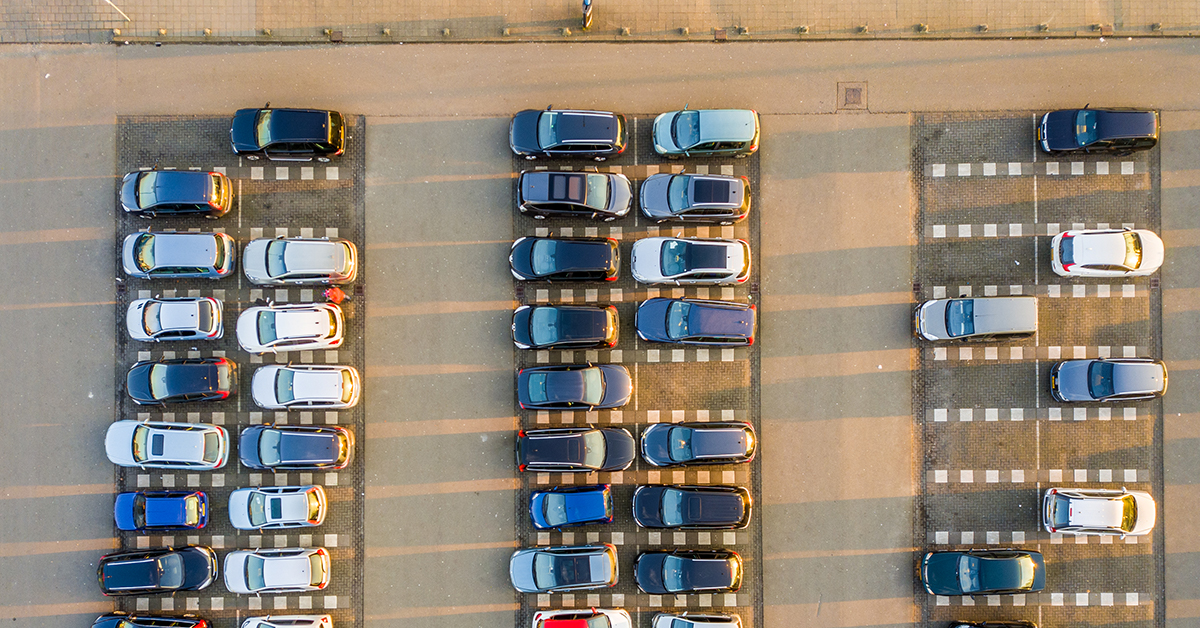First impressions matter, and if you want great curb appeal for your business without busting your budget, then a concrete parking lot must come at the top of your list for customer-friendly solutions. They are neat, easy to maintain, visually pleasing, and far superior to asphalt, grass, or pavers.
At first glance, a concrete parking lot might seem pretty basic, but when you add design customization with their longevity and durability, they easily outlast and outpace other types of parking areas. No ugly potholes, no unseemly cracks, and no dusty uneven surfaces – ever!
Naturally, three lines are insufficient to convince, so here are our top 5 benefits of concrete parking lots for businesses.
Longevity of concrete surfaces
When it comes to sheer robustness, nothing beats concrete. Asphalt and gravel are easier and cheaper to lay; however, they both have serious cons. Asphalt can degrade over time due to temperature fluctuations, UV exposure, and chemical spills, and gravel is strictly a temporary solution that is susceptible to unevenness and potholes right from the beginning.
Concrete, in comparison, lasts a good 30-40 years and barely requires any parking lot maintenance, making it a sustainable parking solution for modern businesses. It can withstand heavy vehicular traffic without succumbing to wear and tear as quickly as its counterparts. It can resist damage from oil and other automotive fluids, which can quickly damage asphalt.
Long-term Cost Benefits of Concrete Parking Lots
Yes, concrete is more expensive to lay down, but it is a wise investment. Concrete requires fewer repairs and maintenance over its lifespan. This means that, unlike asphalt, you will not be shelling out additional dollars for resurfacing and repairs.
It is also weather-friendly and maintains its functionality and appearance for an extended period. You can lay it and forget it – it is a one-time cost!
Low Maintenance Requirements
Asphalt has a far shorter life span than concrete (15-20 years vs 30-40 years), but what is equally important is what happens during these years! Asphalt needs regular maintenance, typically every 2-3 years. This includes:
- Crack sealing: To prevent cracks from widening
- Sealcoating: To protect the asphalt surface from wear and tear, UV rays, and moisture
- Patching: To repair potholes and other surface issues
On the other hand, concrete has high resistance to wear and tear as well as oil and chemicals. It requires pressure washing occasionally and some joint sealing every 5-10 years.
From a financial perspective, the lower maintenance requirements of concrete translate into reduced long-term costs. While asphalt may need frequent patching and resurfacing, concrete requires less attention and fewer repairs. The infrequency of repairs leads to less disruption for businesses and a more cost-effective parking lot solution in the long run.
Cots-Effectiveness: Initial Investment vs. Long-Term Savings
While crafting your commercial parking lot design, the choice of material will hinge on the investment. But to get an accurate picture of costs, you must calculate the cost in decades of usage. While concrete is at least 30% more expensive than asphalt, it lasts almost twice as long and is far more affordable to keep spic and span.
As a material, nothing comes close to the strength and durability of concrete. If you are counting on high traffic volumes (and which business doesn’t!), then concrete will save you from fixing the effects of heavy wear and tear that other materials will undoubtedly suffer.
Commercial Concrete is also impervious to weather, water, oil, and chemicals and will stay intact for far longer compared to asphalt, bitumen, pavers, etc.
Unlike asphalt, concrete reflects the heat of the sun rather than absorb it. This provides a more relaxed atmosphere for users instead of making them feel uncomfortable before entering your business.
Furthermore, concrete parking lots are made with expansion joints to allow for the expansion and contraction of the material that occurs from excessive heat and cold. This allows for fewer cracks in the concrete fields, allowing for a longer life and a more even surface.
Aesthetic Appeal and Decorative Concrete Customization
While the initial image that concrete conjures might be gray and dull, the reality is that business owners have far more control and flexibility to play with the look and feel of concrete parking lots.
The material allows various finishes, textures, and colors, enabling businesses to create customized, visually appealing, and durable parking surfaces. Whether a business wants a sleek, modern look or a more traditional appearance, concrete can be tailored to meet specific design preferences.
A well-designed and maintained parking lot enhances the curb appeal of a property, creating a positive first impression for visitors. Concrete’s design flexibility allows businesses to align their parking lots with their branding and overall architectural style, contributing to a seamless and professional image.
Concrete Pavement Safety and Accessibility
The textured surface of the material is also safer for all users; there is almost no chance of slipping on concrete, especially on rainy or snowy days or with oil spills. In busy commercial areas, the non-slip surface properties of concrete are especially useful to enhance customer safety.
Concrete can also be used to build business parking solutions that comply with accessibility standards such as the Americans with Disabilities Act (ADA). It is easy to include proper slope gradients, ramps, and other accessibility functionalities when building with concrete.
The Bottomline on the Advantages of Choosing Concrete
If you want to offer your customers a functional and comfortable parking space, remember – concrete beats asphalt parking lots every time!
Concrete parking lots offer a compelling list of benefits for businesses: the durability and longevity of concrete, coupled with low maintenance requirements, makes it a financially sensible choice. When choosing concrete parking lots it’s essential to find the right concrete contractor to build the parking lot for your business. From initial cost analysis to the final pour and paint, MBC Management offers the turn-key service that your company needs to make the project a breeze. Contact us today to get started!
Frequently Asked Questions
-
How does a concrete parking lot save money in the long run?
Concrete is a more durable material, and concrete parking lots have an average lifespan of 30-40 years. This is almost double how long an asphalt lot lasts. Additionally, parking lots made of concrete cost far less to maintain compared to other materials.
-
What are the environmental benefits of choosing concrete for parking lots?
Material longevity and fewer cleaning and maintenance cycles result in less wastage of materials and optimum resource consumption. Choosing concrete for parking lots reduces the urban heat island effect through its reflective properties and improves air quality by emitting no harmful compounds.
-
How does concrete compare to other materials in terms of maintenance?
Concrete requires the least amount of maintenance compared to other parking lot materials. It usually only needs some pressure cleaning and joint sealing every 5-10 years.
-
Can a concrete parking lot improve my business’s curb appeal?
Certainly, concrete comes in many colors, textures, and designs that can be stamped to enhance it visually.
-
Is a concrete parking lot compliant with ADA regulations?
Yes, concrete parking lots can easily be used to realize designs that comply with ADA regulations.




